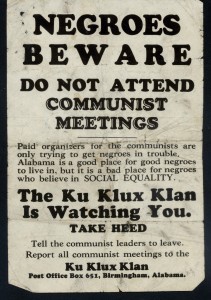Creator: Johnson, Guy Benton, 1901-1991.
Collection number: 3826
View finding aid.
Abstract: Guy Benton Johnson was one of the original research assistants at the Institute for Research in Social Science and joined the faculty of the University of North Carolina in 1927, retiring in 1969. In 1923, he married Guion

Griffis, also a social science researcher. They had two sons: Guy Benton Jr. (Benny) (b. 1928) and Edward (b. 1933). Papers, mostly correspondence and research project files, relating chiefly to Johnson’s work at the University of Chicago and at UNC on the Ku Klux Klan; musical abilities of African-Americans and white Americans; African-American folksongs; the John Henry legend; the folklore and language (Gullah) of Saint Helena Island, S.C.; Lumbee Indians of Robeson County, N.C.; and the desegregation of higher education. Many items relate to his and Guion’s participation in the Gunnar Myrdal Study of the American Negro, 1939-1940. There are also materials documenting Johnson’s work with the Southern Regional Council, of which he was director in 1944-1947; the North Carolina Council on Human Relations; the Phelps-Stokes Fund; and the Howard University Board of Trustees; and his service to professional sociological organizations. Also included are writings by Johnson, pedagogical materials, photographs and other materials relating to his family in North Carolina and Texas and career. Johnson’s correspondents included Langston Hughes, Charles S. Johnson, C.C. Spaulding, H.L. Mencken, Carl van Vechten, W.E.B. Du Bois, Marion Wright, and many other intellectuals, scholars, writers, and activists, both black and white.
Repository: Southern Historical Collection
Collection Highlights: Some of the materials on this collection have been digitized and are available online. Click here to link to the finding aid and to access the digital material.
Papers relate to Johnson’s extensive cultural and sociological studies and projects conducted under the auspices of organizations such as the Institute for Research in Social Science, the Southern Regional Council, the North Carolina Council on Human Relations, the Phelps-Stokes Fund, and the Board of Trustees of Howard University.
Subseries 1.2 and 1.3 (Correspondence) contain a number of letters discussing race relations, school desegregation, the Ku Klux Klan, Gullah/Geechee culture and language, and as well as Johnson’s trip to Africa and the idea for an exchange program for African students. Additional items of interest include a sermon by Pauli Murray, entitled “Gifts of the Holy Spirit to Women I Have Known,” enclosed in a letter to Johnson dated 18 May 1978, and a letter, dated 12 October 1983, to Johnson discussing the controversy over Langston Hughes’ appearance at University of North Carolina in 1931.
Series 2 (Alumni Office Files) contains letters on various topics including race relations, civil rights, music, and different African American Freedom Celebrations. Johnson’s correspondents include a large number of black political leaders, journalists, and intellectuals, such as Will W. Alexander, Sterling Brown, W. E. B. Du Bois, Langston Hughes, Alain Locke, and Mary McLeod Bethune.
Of particular notes in Subseries 3.2.2 (Publications) are drafts and research notes for “The Police and The Negro” (Folders 795-797).
Also of note are the various research projects Johnson conducted with focus on African American life and culture. See Series 5 for a complete listing of the projects. Of particular note is the study he conducted on Gullah language and culture in South Carolina, entitled Folk Culture of Saint Helena Island. This research study includes stories and riddles from students of the Penn Center on the island, as well as some recordings of songs. Some of these materials have been digitized.
There are also a number of photographs in this collection related to Johnson’s family life and his research. Of note are the photographs of African American churches in Chapel Hill, N.C. (Image folder 3826/41) and various scenes and houses in the African American communities on Saint Helena Island, S.C. (Image Folders 3826/35-36).
Folders 94-99, 313, and 320 contain materials relating to the “Encyclopedia of the Negro” project in the 1930s and 1940s, including correspondence with Dr. W.E.B. Du Bois (who was principle editor of the Encyclopedia) and other noted academics.
Folder 97 also contains a letter dated 4 November 1939 from Anson Phelps Stokes as a representative from the Marian Anderson Committee, which was formed after the Daughters of the American Revolution refused to allow her to perform at Constitutional Hall in DC based on the fact she was an African American artist. The Committee formed after this refusal, to continue to petition the DAR to allow Ms. Anderson to perform.
